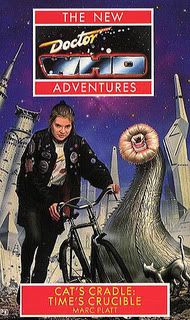 In brief: Hmm. Ugh. huh? ZZZZzzzz. Oh! Huh? Hmm.
So now I've moved past The Doctor and Ace fighting The Timewyrm and find myself beginning a threesome of novels under the Cat's Cradle umbrella. While not as strongly linked as with the earlier series these books have a common theme that "something is wrong with the TARDIS", as evidenced by the occasional appearance of a mysterious silver cat.
I suspect that author Marc Platt (who also wrote the 1989's televised Ghost Light) desperately wanted to try to move Doctor Who away from being "that silly kid's/family show"(as if that were a bad thing) as it was perceived at the time and instead make it into Serious Science-Fiction. Remember that we're still only in 1992 when the mindset was that Good=Serious in regards to sci-fi (the days of Alien3, Terminator 2 and the adventures of the USS Talkathon in "Star Trek: The Next Generation"). Unfortunately he forgot that the greatest sin is not Silly Doctor Who or even Bad Doctor Who but is in fact Boring Doctor Who ("The Monster of Peladon", "Underworld", "Terminus", etc.). So with little wit or humour this was fairly tough going.
While the first part of the book and subsequent sections set in a Roman-style Ancient Gallifrey are interesting unfortunately the bulk of the story revolves around boring characters in multiple grey ruined time-zones dealing with the terror brought on by a giant hissing time-leech (I'm still not sure of The Process was an alien intruder or a function of the damaged TARDIS). The book is easily about 100 pages too long and needed to be trimmed. As mentioned the worst part is the long middle section revolves around (a rather blandly written) Ace wandering around the grey wasteland that the TARDIS becomes after crashing into another Time Vehicle from Gallifrey's distant past (Couldn't they have just bought Temporal Air-Bags?). Added to the fact that the Doctor is absent or amnesiac for much of the time means that the novel is somewhat of a chore to read.
However I don't want to say that the book was completely a waste of time since at least Platt tried to push Doctor Who in another new direction, even if it doesn't work. I can on that front appreciate this book much more than Genesys or Apocalypse which were nowhere near as adventurous. So I'll mark down Time's Crucible down as a "failed but bold experiment" and move on.
So maybe this is the Warriors Gate of the book range...
In brief: Hmm. Ugh. huh? ZZZZzzzz. Oh! Huh? Hmm.
So now I've moved past The Doctor and Ace fighting The Timewyrm and find myself beginning a threesome of novels under the Cat's Cradle umbrella. While not as strongly linked as with the earlier series these books have a common theme that "something is wrong with the TARDIS", as evidenced by the occasional appearance of a mysterious silver cat.
I suspect that author Marc Platt (who also wrote the 1989's televised Ghost Light) desperately wanted to try to move Doctor Who away from being "that silly kid's/family show"(as if that were a bad thing) as it was perceived at the time and instead make it into Serious Science-Fiction. Remember that we're still only in 1992 when the mindset was that Good=Serious in regards to sci-fi (the days of Alien3, Terminator 2 and the adventures of the USS Talkathon in "Star Trek: The Next Generation"). Unfortunately he forgot that the greatest sin is not Silly Doctor Who or even Bad Doctor Who but is in fact Boring Doctor Who ("The Monster of Peladon", "Underworld", "Terminus", etc.). So with little wit or humour this was fairly tough going.
While the first part of the book and subsequent sections set in a Roman-style Ancient Gallifrey are interesting unfortunately the bulk of the story revolves around boring characters in multiple grey ruined time-zones dealing with the terror brought on by a giant hissing time-leech (I'm still not sure of The Process was an alien intruder or a function of the damaged TARDIS). The book is easily about 100 pages too long and needed to be trimmed. As mentioned the worst part is the long middle section revolves around (a rather blandly written) Ace wandering around the grey wasteland that the TARDIS becomes after crashing into another Time Vehicle from Gallifrey's distant past (Couldn't they have just bought Temporal Air-Bags?). Added to the fact that the Doctor is absent or amnesiac for much of the time means that the novel is somewhat of a chore to read.
However I don't want to say that the book was completely a waste of time since at least Platt tried to push Doctor Who in another new direction, even if it doesn't work. I can on that front appreciate this book much more than Genesys or Apocalypse which were nowhere near as adventurous. So I'll mark down Time's Crucible down as a "failed but bold experiment" and move on.
So maybe this is the Warriors Gate of the book range...
Since I was away on holiday last week I had a chance to plough through a few more of the Doctor Who New Adventures novels from the 1990s:
The rest of Timewyrm: Genesys:
Unfortunately the book doesn't get any better as it goes on, with most of the characters never being more than broad caricatures and the story being a standard "evil alien wants to take over Earth's past" plot. In particular the alien Ishtar (prior to accidentally absorbing part of the Tardis and becoming the Timewyrm) is purely in the "You'll never defeat me! BWAH HAHA!" vein of villainy. Even the Doctor and Ace aren't quite right with it being very difficult to picture Sylvester McCoy or Sophie Aldred actually saying any of the lines that the characters are given. By the end the awful continuity references start to become insufferable with the Doctor for no apparently good reason taking on the personality of the Third Doctor to solve the climax, which is just stupid.
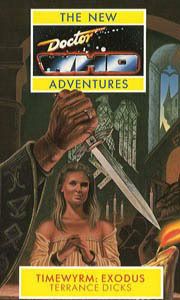 Timewyrm: Exodus by Terrance Dicks
In chasing the Timewyrm the Doctor and Ace find themselves in a version of London under Nazi control, and also into a much better book. Finally freed from having to novelise all of those Target Paperbacks throughout the 1980s Terrance Dicks crafts an engrossing tale of a Britain which has had its history changed. The increase in the quality from the previous book is notable with all of the characters, including thankfully the Doctor and Ace, being fully fleshed out and interesting. The first half of the book, set in the alternate 1951 is excellent, and is a real page turner. I did find though that once the Tardis heads further into the past to get to the root of the meddling things do go a bit down-hill. While the story is still very entertaining that bug-bear of overdone continuity from Genesys rears its head. While not as clunky as before having The War Lords from 1969's The War Games turn up does seem a bit unnecessary (it turns out Hitler was actually one of their experiments.). If the books were trying to capture a new audience does it really make sense to have the baddies turn out to be from a story told 22 years beforehand?
However Dicks' decision to keep the Timewyrm very much in the background (she tried to take over Hitler and got caught in his deranged mind) works very well since it avoids her cartoon villainy. Unfortunately the ending is spoilt by the Doctor again pulling a device out of his arse, sorry I mean out of the Tardis, in order to dispatch the Timewyrm. Still, for style of writing and quality of character Exodus is very good (and much better than the first novel).
Timewyrm: Exodus by Terrance Dicks
In chasing the Timewyrm the Doctor and Ace find themselves in a version of London under Nazi control, and also into a much better book. Finally freed from having to novelise all of those Target Paperbacks throughout the 1980s Terrance Dicks crafts an engrossing tale of a Britain which has had its history changed. The increase in the quality from the previous book is notable with all of the characters, including thankfully the Doctor and Ace, being fully fleshed out and interesting. The first half of the book, set in the alternate 1951 is excellent, and is a real page turner. I did find though that once the Tardis heads further into the past to get to the root of the meddling things do go a bit down-hill. While the story is still very entertaining that bug-bear of overdone continuity from Genesys rears its head. While not as clunky as before having The War Lords from 1969's The War Games turn up does seem a bit unnecessary (it turns out Hitler was actually one of their experiments.). If the books were trying to capture a new audience does it really make sense to have the baddies turn out to be from a story told 22 years beforehand?
However Dicks' decision to keep the Timewyrm very much in the background (she tried to take over Hitler and got caught in his deranged mind) works very well since it avoids her cartoon villainy. Unfortunately the ending is spoilt by the Doctor again pulling a device out of his arse, sorry I mean out of the Tardis, in order to dispatch the Timewyrm. Still, for style of writing and quality of character Exodus is very good (and much better than the first novel).
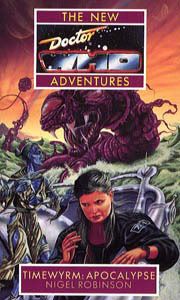 Timewyrm: Apocalypse by Nigel Robinson
After defeating the War Lords and dispatching the Timewyrm from Hitler's mind the Doctor and Ace find themselves on an apparently idyllic alien world in the far future. And as with almost all idyllic worlds found in sci-fi stories there's a Horrible Truth(tm) to be discovered. Apocalypse is a book I remembered almost nothing about, and with good reason. There's nothing at all original to find in this novel. I suspect that Robinson must be a massive Patrick Troughton fan, since not only is the plot a mix of 60s stories The Macra Terror and The Krotons but the 2nd-Doctor (albeit a hologram) even pops up to give the 7th a few vague (and useless) warnings.
There's not really much more I can think to say about the book since really it's all so inconsequential. At the end the Timewyrm is again dispatched back to the Vortex (this time from the mind of the evil Grand Matriarch of the Panjistri) and the desperately dull Kirithon are left to their own destiny. It's not as bad as Genesys but just feels lazy.
Timewyrm: Apocalypse by Nigel Robinson
After defeating the War Lords and dispatching the Timewyrm from Hitler's mind the Doctor and Ace find themselves on an apparently idyllic alien world in the far future. And as with almost all idyllic worlds found in sci-fi stories there's a Horrible Truth(tm) to be discovered. Apocalypse is a book I remembered almost nothing about, and with good reason. There's nothing at all original to find in this novel. I suspect that Robinson must be a massive Patrick Troughton fan, since not only is the plot a mix of 60s stories The Macra Terror and The Krotons but the 2nd-Doctor (albeit a hologram) even pops up to give the 7th a few vague (and useless) warnings.
There's not really much more I can think to say about the book since really it's all so inconsequential. At the end the Timewyrm is again dispatched back to the Vortex (this time from the mind of the evil Grand Matriarch of the Panjistri) and the desperately dull Kirithon are left to their own destiny. It's not as bad as Genesys but just feels lazy.
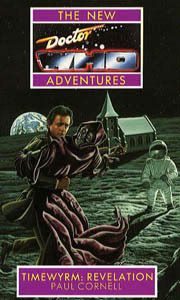 Timewyrm: Revelation by Paul Cornell
Notice the cover? That's an actual scene from the book. It's the Doctor dancing with Death on the moon while being watched by an 8-year old astronaut and a sentient church.
Before things get *really* weird.
How did this book get published? The question isn't derogatory since Revelation is phenomenal. I'd go so far as to far as to say in its blowing apart the conventions of Doctor Who its influence can still be felt today (especially considering that the Paul Cornell has so far written 3 episodes of the new series). It's frankly amazing that 4 books into the series (and where things were kept very "safe" in the first 3) the publishers were brave enough to foist this on the public.
Revelation is filled with symbolism, allegory and philosophy which addresses reality, sentience, the import of memory and the existence of the soul. It's here that the New Adventures really takes off, with the Doctor becoming the Dark Manipulator of the universe constantly juggling ten different plans at any one time. Also the book does no end of wonders for Ace, as we truly get to know what makes her tick as she has her memory and personality slowly taken away by the Timewyrm as she races through the Doctor's mind (the section where she reasserts herself in the face of an alternative personality is incredible). And while the book is still heavy with continuity here it makes perfect sense as so much of the novel takes place within the Doctor's memories. While to the unfamiliar reader much may at first not make sense things are nicely explained and wrapped up by the end of the book (although there's still a few bits left to interpretation, as it should be).
And Cornell even manages to make The Timewyrm interesting.
Quite simply, amazing.
Timewyrm: Revelation by Paul Cornell
Notice the cover? That's an actual scene from the book. It's the Doctor dancing with Death on the moon while being watched by an 8-year old astronaut and a sentient church.
Before things get *really* weird.
How did this book get published? The question isn't derogatory since Revelation is phenomenal. I'd go so far as to far as to say in its blowing apart the conventions of Doctor Who its influence can still be felt today (especially considering that the Paul Cornell has so far written 3 episodes of the new series). It's frankly amazing that 4 books into the series (and where things were kept very "safe" in the first 3) the publishers were brave enough to foist this on the public.
Revelation is filled with symbolism, allegory and philosophy which addresses reality, sentience, the import of memory and the existence of the soul. It's here that the New Adventures really takes off, with the Doctor becoming the Dark Manipulator of the universe constantly juggling ten different plans at any one time. Also the book does no end of wonders for Ace, as we truly get to know what makes her tick as she has her memory and personality slowly taken away by the Timewyrm as she races through the Doctor's mind (the section where she reasserts herself in the face of an alternative personality is incredible). And while the book is still heavy with continuity here it makes perfect sense as so much of the novel takes place within the Doctor's memories. While to the unfamiliar reader much may at first not make sense things are nicely explained and wrapped up by the end of the book (although there's still a few bits left to interpretation, as it should be).
And Cornell even manages to make The Timewyrm interesting.
Quite simply, amazing.
Through some dark and geeky masochistic streak I've decided to re-visit Doctor Who as it was from 1991-2005:
a series of books.
Barring one notable evening in May 1996 when we got 90-minutes of Grace: 1999 (aka The McGann Movie).
But yes, rewind to 1991. It had been a scant 2 years since the series had last aired.
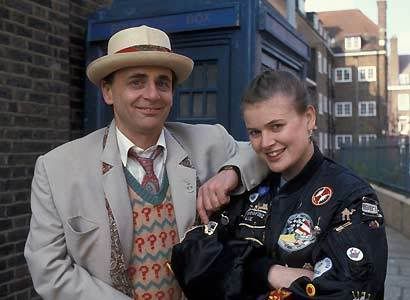 Doctor #7 and Ace (She was like totally rad in 1988) were caught in a strange limbo. They were still the current Tardis "team", yet there was no show to be seen.
By this point it was becoming fairly obvious that the BBC had no intention of bringing back the show anytime soon (it was never actually "canceled", just put "on hold". For 16 years...). Into the fray stepped Virgin Publishing with their aim to begin a series of original novels that would pick up where the series ended. Plus the added bonus that we'd have whatever constituted "Stories too Broad and too Deep for the Small Screen".
*snerk*. Broad and Deep "Virgin Doctor Who Books". Oh the innuendo that was had!
So to kick things off we got a series of 4 books which would revolve around the Doctor fighting the Malevolent Timewyrm(sic).
Doctor #7 and Ace (She was like totally rad in 1988) were caught in a strange limbo. They were still the current Tardis "team", yet there was no show to be seen.
By this point it was becoming fairly obvious that the BBC had no intention of bringing back the show anytime soon (it was never actually "canceled", just put "on hold". For 16 years...). Into the fray stepped Virgin Publishing with their aim to begin a series of original novels that would pick up where the series ended. Plus the added bonus that we'd have whatever constituted "Stories too Broad and too Deep for the Small Screen".
*snerk*. Broad and Deep "Virgin Doctor Who Books". Oh the innuendo that was had!
So to kick things off we got a series of 4 books which would revolve around the Doctor fighting the Malevolent Timewyrm(sic).
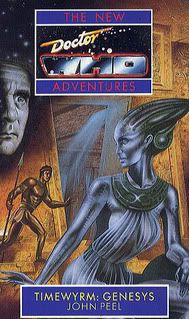 It was the early-90s, oddly placed Ys were cool.
Amazingly the Virgin Adventures (*guffaw*) ended up being very successful (helped by now-familiar authors such as Paul Cornell, Gareth Roberts and a certain Russell T Davies). Well successful enough that after 1996 the BBC brought the series in-house for the transition from Doctor #7 to #8(although I stopped reading at that point). It could actually be argued that the popularity of the books allowed for the Big Finish Audio series to thrive which helped convince the BBC to take a risk in 2003 and announce that the show was coming back. It's amazing in these days with 5 hugely popular series and 3 more Doctors behind us how unlikely the series ever being made again once seemed let alone how hugely successful its been.
Anyways, I'm now about 2/3rds of the way through Genesys and I'm finding the experience...odd. The book is so "Doctor Who as it was" as to seem very very strange indeed in this post-Billie Piper world. What stands out most is the constant continuity references, with multiple references to the likes of Adric, Katarina, Sontarans, Time Lords, Leela, K9 and a multitude of past stories. I'd forgotten how *cliquey* the show had become by the time it had gone off air, with a sense that in order to be a "fan" you had to know every little fact and figure about the entire 26-year run of the show. I think that's probably one of the main factors as to why the show became so unpopular by the late-80s (although some truly terrible stories (Warriors of the Deep, Attack of the Cybermen, Timelash, Trial of a Timelord, Time and the Rani, etc.), a horrifically slashed budget and Colin Baker's coat I suspect also contributed).
I'd also forgotten how much the series had become about Ace by this time, with the malcontent from Perivale very much hogging the spotlight away from the Doctor. It's sort of amazing to remember how important the character was to the show for so long considering how forgotten she's now become in comparison to the likes of Sarah Jane Smith or even Jo Grant.
However, now that I'm past the first desperately clunky (and most continuity-laden) chapters I'm finding the book to be much more enjoyable than I expected. Well, despite John Peel's less than stellar writing abilities, although he is good at keeping things very "visual". This is an easy book to picture in the mind. I know that the series does get much better as it goes along so I'm willing to give it some slack. Actually, it's rather impressive how quickly the series started to move away from the initial set-up and become much more original (getting rid of Ace and bringing in Benny for instance). I'm also impressed how rather than going for a "futuristic" start we've got a story set in 2500BC Mesopotamia (albeit with an alien menace pretending to be a God).
It's also interesting how much of this first book I still remember despite last reading it almost 20 years ago. Although it's probably not surprising considering how much sex and nudity there is in it (especially descriptions of 13-year-old prostitutes; John Peel was a bit of a perv), which I remember all seeming terrifically naughty to a pre-teen Andrew (and obviously stuck in the mind).
Considering that I'm now well through the first novel I hopefully will be able to get my way through the entire series over the coming months, and then on to the BBC 8th-Doctor books which I've never read.
So I'm happy to say that I'm surprised that despite being from a previous "era" the New Adventures still seems to hold up very well. Although I suspect that very very few post-2005 fans will ever read them, which is a bit of a shame.
It was the early-90s, oddly placed Ys were cool.
Amazingly the Virgin Adventures (*guffaw*) ended up being very successful (helped by now-familiar authors such as Paul Cornell, Gareth Roberts and a certain Russell T Davies). Well successful enough that after 1996 the BBC brought the series in-house for the transition from Doctor #7 to #8(although I stopped reading at that point). It could actually be argued that the popularity of the books allowed for the Big Finish Audio series to thrive which helped convince the BBC to take a risk in 2003 and announce that the show was coming back. It's amazing in these days with 5 hugely popular series and 3 more Doctors behind us how unlikely the series ever being made again once seemed let alone how hugely successful its been.
Anyways, I'm now about 2/3rds of the way through Genesys and I'm finding the experience...odd. The book is so "Doctor Who as it was" as to seem very very strange indeed in this post-Billie Piper world. What stands out most is the constant continuity references, with multiple references to the likes of Adric, Katarina, Sontarans, Time Lords, Leela, K9 and a multitude of past stories. I'd forgotten how *cliquey* the show had become by the time it had gone off air, with a sense that in order to be a "fan" you had to know every little fact and figure about the entire 26-year run of the show. I think that's probably one of the main factors as to why the show became so unpopular by the late-80s (although some truly terrible stories (Warriors of the Deep, Attack of the Cybermen, Timelash, Trial of a Timelord, Time and the Rani, etc.), a horrifically slashed budget and Colin Baker's coat I suspect also contributed).
I'd also forgotten how much the series had become about Ace by this time, with the malcontent from Perivale very much hogging the spotlight away from the Doctor. It's sort of amazing to remember how important the character was to the show for so long considering how forgotten she's now become in comparison to the likes of Sarah Jane Smith or even Jo Grant.
However, now that I'm past the first desperately clunky (and most continuity-laden) chapters I'm finding the book to be much more enjoyable than I expected. Well, despite John Peel's less than stellar writing abilities, although he is good at keeping things very "visual". This is an easy book to picture in the mind. I know that the series does get much better as it goes along so I'm willing to give it some slack. Actually, it's rather impressive how quickly the series started to move away from the initial set-up and become much more original (getting rid of Ace and bringing in Benny for instance). I'm also impressed how rather than going for a "futuristic" start we've got a story set in 2500BC Mesopotamia (albeit with an alien menace pretending to be a God).
It's also interesting how much of this first book I still remember despite last reading it almost 20 years ago. Although it's probably not surprising considering how much sex and nudity there is in it (especially descriptions of 13-year-old prostitutes; John Peel was a bit of a perv), which I remember all seeming terrifically naughty to a pre-teen Andrew (and obviously stuck in the mind).
Considering that I'm now well through the first novel I hopefully will be able to get my way through the entire series over the coming months, and then on to the BBC 8th-Doctor books which I've never read.
So I'm happy to say that I'm surprised that despite being from a previous "era" the New Adventures still seems to hold up very well. Although I suspect that very very few post-2005 fans will ever read them, which is a bit of a shame.





